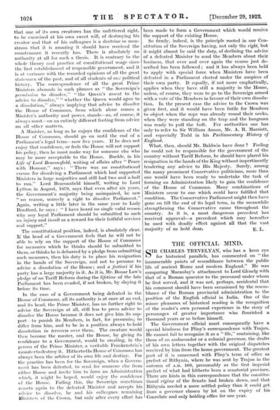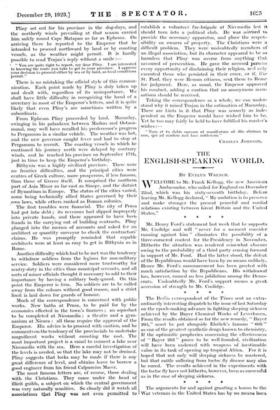THE OFFICIAL MIND.
SIR CHARLES TREVELYAN, who has a keen eye for historical parallels, has commented on " the innumerable points of resemblance between the public life of ancient Rome and modern England." He was comparing Macaulay's attachment to Lord Glenelg with that of a Roman quaestor to the proconsul under whom he first served, and it was not, perhaps, accidental that his comment should have been occasioned by the resem- blance of the Roman provincial administration to the position of the English official in India. One of the minor pleasures of historical reading is the recognition of the reader's own personal experience in the story of personages of greater importance who flourished a thousand years or so before himself.
The Government official must consequently have a special kindness for Pliny's correspondence with Trajan. He cannot fail to recognize it as a " file," containing, like those of an ambassador or a colonial governor, the drafts of his own letters together with the original dispatches received by him from the home government. The greatest part of it is concerned with Pliny's term of office as prefect of Bithynia, where he was sent by Trajan in the autumn of A.D. 109, presumably as the first imperial prefect of what had hitherto been a senatorial province. There are hints in this correspondence that the constitu- tional regime of the Senate had broken down, and that Bithynia needed a more settled policy than it could get from a governor chosen by lot on the expiry of his Consulate and only holding office for one year. Pliny set out for his province in the dog-days, and the northerly winds prevailing at that season carried him safely round Cape Matapan as far as Ephesus. On arriving there he reported to the Emperor that he intended to proceed northward by land or by coasting vessels, as the weather might permit. It is hardly possible to read Trajan's reply without a smile :- 1 " You are quite right to report, my dear Pliny. I am interested in knowing the route you take to get to your province. I approve your decision to proceed either by sea or by land, as local conditions permit."
There is no mistaking the official style of this commu- nication. Each point made by Pliny is duly taken up and dealt with, regardless of its unimportance. We shall have little difficulty in recognizing the hand of a secretary in most of the Emperor's letters, and it is quite likely that even Pliny's are sometimes written by a subordinate.
From Ephesus Pliny proceeded by land. Macaulay, swinging in his palankeen between Madras and Ootaca- mund, may well have recalled his predecessor's progress to Pergamum in a similar vehicle. The weather was hot, and the new governor caught fever and had to stop at Pergamum to recruit. The coasting vessels in which he continued his journey north were delayed by contrary winds, and he reached his province on September 17th, just in time to keep the Emperor's birthday.
Bithynia was a highly civilized province. There were no frontier difficulties, and the principal cities were centres of Greek culture, more prosperous, if less famous, than those of Greece itself. It comprised the northern part of Asia Minor as far east as Sinope, and the district of Byzantium in Europe. The status of the cities varied, some being technically allied States governed by their .own laws, while others ranked as Roman colonies. The first troubles were financial. The city of Prusa had got into debt ; its revenues had slipped improperly into private hands, and there appeared to have been frauds in the carrying out of building contracts. Pliny plunged into the morass of accounts and asked for an architect or quantity surveyor to check the contractors' claims. He was promptly reminded that capable architects were at least as easy to get in Bithynia as in Rome.
Another difficulty which had to be met was the tendency to withdraw soldiers from the legions for non-military service. Soldiers were considered more trustworthy for sentry-duty in the cities than municipal servants, and all sorts of minor officials thought it necessary to add to their importance by having a military body-guard. On this point the Emperor is firm. No soldiers are to be called away from the colours without good reason, and a strict limit is laid down for guards of honour.
Much of the correspondence is concerned with public Works. New baths at Prusa, to be paid for by the economies effected in the town's finances ; an aqueduct to be completed at Nicomedia ; a theatre and a gym- nasium at Nicaea : all these require the approval of the Emperor. His advice is to proceed with caution, and he comments on the tendency of the provincials to undertake magnificent works without counting the cost. The most important project is a canal to connect a lake near Nicomedia with the sea. Here a careful investigation of the levels is needed, so that the lake may not be drained. Pliny suggests that locks may be made if there is any great difference of level, and obtains leave to borrow a good engineer from his friend Calpurnius Macer.
The most famous letters are, of course, those dealing with the Christians. They came under the head of illicit guilds, a subject on which the central government was very naturally sensitive. So closely did it watch all associations that Pliny was not even permitted to establish a voluntec:r fire-brigade at Nicomedia lest it should turn into a political club. He was arivised to provide the necessary apparatus, and place the respon- sibility on owners of property. The Christians were a difficult problem. They were undoubtedly members of an illegal association, but its character appeared to be so harmless that Pliny was averse from anything that savoured of persecution. He gave the accused persons every opportunity of disclaiming their religion, and only executed those who persisted in their error, or if, like St. Paul, they were Roman citizens, sent them to Rome for judgment. Here, as usual, the Emperor approved his conduct, adding a caution that no anonymous accu- sations should be received.
Taking the correspondence as a whole, we can under- stand why it raised Trajan in the estimation of Macaulay. There are hints in it that Pliny was scarcely as inde- pendent as the Emperor would have wished him to be. Yet he too may fairly be held to have fulfilled his master's wishes :— " Nam et to dubis operam ut manifestum sit illis elcetum to
esse, qui ad cosdem mci loco. mittereris."
CHARLES JOHNSON.



































 Previous page
Previous page